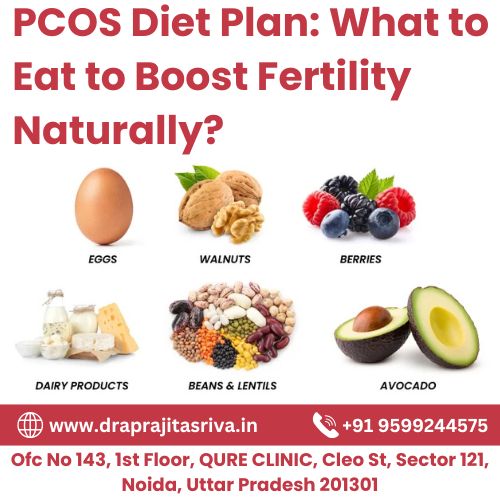Polycystic Ovary Syndrome (PCOS) is one of the most common hormonal disorders affecting women of reproductive age. It’s also a leading cause of infertility. The good news? PCOS can be effectively managed with the right lifestyle and dietary changes. A healthy PCOS diet not only improves hormonal balance but can also significantly boost fertility — naturally.
If you’re trying to conceive and are dealing with PCOS, adjusting your eating habits can make a big difference. This guide will help you understand what to eat and what to avoid, and how a tailored PCOS diet can enhance your chances of becoming pregnant.

Understanding the Link Between PCOS and Fertility
Women with PCOS often struggle with ovulation due to imbalanced hormone levels, which affects menstrual cycles and reduces the likelihood of conceiving. Insulin resistance is also common, which can lead to weight gain and further hormonal imbalances.
However, making specific dietary choices can reduce these symptoms and regulate ovulation, thereby improving fertility naturally.
Best Foods to Include in Your PCOS Fertility Diet
1. High-Fiber Foods
Fiber helps regulate blood sugar and improve insulin sensitivity — both crucial for women with PCOS. Aim for whole grains, vegetables, fruits, and legumes. Foods like oats, quinoa, broccoli, and carrots are excellent options.
2. Lean Proteins
Protein stabilizes blood sugar levels and supports weight loss. Choose lean options like chicken, turkey, tofu, eggs, and fish. These also provide essential amino acids that support reproductive health.
3. Healthy Fats
Good fats reduce inflammation and support hormone production. Avocados, olive oil, nuts, seeds, and fatty fish like salmon are great additions to a PCOS-friendly fertility diet.
4. Low-Glycemic Index (GI) Carbohydrates
Avoid spikes in blood sugar by choosing low-GI carbs such as sweet potatoes, brown rice, lentils, and whole grains. These foods are digested slowly, helping maintain stable insulin levels.
5. Anti-Inflammatory Foods
Chronic inflammation worsens PCOS symptoms. Include berries, green leafy vegetables, tomatoes, turmeric, and green tea to help reduce inflammation.
6. Iron-Rich Foods
Since women with PCOS often experience heavy periods, iron-deficiency anemia can be a concern. Incorporate iron-rich foods like spinach, lentils, and pumpkin seeds to replenish iron levels.
Foods to Avoid
- Refined Carbohydrates: White bread, pastries, sugary snacks, and soft drinks cause insulin spikes.
- Processed Meats: High in saturated fats and chemicals that may disrupt hormone levels.
- Dairy in Excess: Some women with PCOS may find relief by reducing dairy intake, though this varies per individual.
- Excess Sugar: Avoid candies, soda, and even “healthy” granola bars that contain hidden sugars.
- Trans Fats: Found in fried foods and baked goods, they increase inflammation and insulin resistance.
Lifestyle Tips to Support Your Diet
- Stay Active: Combine your diet with regular exercise like walking, yoga, or strength training to support weight management and hormonal balance.
- Manage Stress: Practice mindfulness, deep breathing, or meditation to reduce cortisol levels which can impact fertility.
- Stay Hydrated: Drink plenty of water throughout the day to support metabolism and reduce cravings.
Personalized Care Matters – Dr. Aprajita Srivastava Can Help
When it comes to managing PCOS and boosting fertility, personalized medical guidance can make all the difference. Dr. Aprajita Srivastava, a renowned gynecologist, reproductive endocrinologist, and fertility specialist in Noida, offers comprehensive and compassionate care tailored to each woman’s unique health needs.
Dr. Aprajita Srivastava believes in integrating diet, lifestyle changes, and medical treatments to improve fertility outcomes for women with PCOS.
With her guidance, many couples have successfully overcome hormonal imbalances and achieved their dream of parenthood. Whether you’re newly diagnosed or have been struggling for a while, her clinic is a trusted center for infertility treatment in Noida.
Why Diet is Crucial in Infertility Treatment in Noida?
In clinics like Dr. Aprajita Srivastava’s, nutritional counselling is often a cornerstone of treatment plans for PCOS. Medical research supports that women who follow a low-GI, anti-inflammatory diet have better ovulation rates and improved chances of conception.
Incorporating these dietary changes not only supports natural fertility but also enhances the effectiveness of medical fertility treatments like ovulation induction and IVF.
Final Thoughts
Managing PCOS doesn’t have to be overwhelming. With the right diet and lifestyle changes, your body can regain hormonal balance and restore fertility. If you’re looking for expert support, Dr. Aprajita Srivastava in Noida is here to guide you every step of the way.
For those seeking infertility treatment in Noida, combining a targeted PCOS diet with professional care is a powerful first step toward building the family you’ve always dreamed of.
Dr. Aprajita Srivastava
Address – Ofc No 143, 1st Floor, QURE CLINIC, Cleo St, Sector 121, Noida, Uttar Pradesh 201301
Email –contact@draprajitasrivastava.in
Phone – 9599244575
Google Map Location Listing –https://maps.app.goo.gl/UpEeKN9QswpunDx49
Dr. Aprajita Srivastava is a highly experienced IVF Specialist in Noida, Gynecologist, and Obstetrician with over 13 years of expertise. Holding an MBBS, DGO, and a Fellowship in Minimal Access Gynaecology Surgery & Reproductive Medicine, she specializes in IVF, IUI, and advanced fertility treatments.
Practicing at Qure Clinic, Sector 121, Noida, Dr. Aprajita is dedicated to compassionate care, personalized solutions, and helping families achieve their dream of parenthood.
